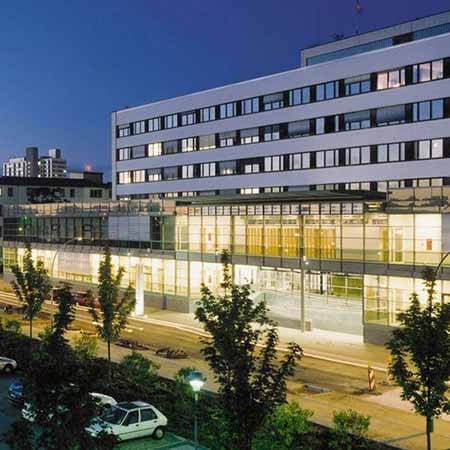Multiple sclerosis
Multiple sclerosis is a chronic, incurable autoimmune disease, that affects the central nervous system. In most cases this disease leads to disability as it causes irreversible neurological disorders. Recent studies have shown that improvement of the patient’s quality of life and life expectancy is possible. This is associated with the dynamic development of the healthcare system in the prosperous countries.
The Booking Health portal presents 69 German clinics specializing in multiple sclerosis treatment
Show all clinics
Multiple sclerosis – Diagnostics
Magnetic resonance imaging is the main method of diagnostics in the case of multiple sclerosis. McDonald diagnostic criteria are mostly used for diagnosing multiple sclerosis. MRI allows to reveal "dumb" foci of demyelination (without clinical manifestations) and to assess the development of the disease.
Other examination methods are:
- Ophthalmoscopy
- Electronystagmography
- Audiometry
- Stabilography
- Cerebrospinal fluid analysis (detection of antibodies indicative of an autoimmune damage of the central nervous system)
MRI is performed in 1-2 months to establish the fact of a pathology progressing and to diagnose the multiple sclerosis without further deteriorations.
Best clinics for the multiple sclerosis diagnostics in Germany:
Multiple sclerosis – Treatment
The basis for treatment of multiple sclerosis is a conservative therapy. Thanks to improved healthcare systems in recent years, patients who suffer from this illness tend to preserve their working capacity and to improve quality of life. European and especially German hospitals are the best ones to undergo treatment and achieve the best possible results.
Main purposes of the treatment are:
- Prevention of exacerbations, prolonging the remission period
- Controlling the disease exacerbations
- Reduction of the residual neurological effects after exacerbations
- Patients' lifestyle modification and further rehabilitation
- Elimination of symptoms
There are many programs of conservative therapy for multiple sclerosis that help to achieve good results. New medicines or their combinations are constantly being investigated.
Stem cells treatment is also performed nowadays. The following types are used:
- Mesenchymal stem cells
- Hemocytoblasts
- Nerve stem cells
These trials are not completed, but in some countries patients are already been treated with the stem cells therapy. Presumably, they can significantly slow down the progression of the disease.
Best clinics for the multiple sclerosis treatment in Germany:

Beta Clinic Bonn

Bundeswehr Hospital Berlin

Charite University Hospital Berlin
Multiple sclerosis – Rehabilitation
The most modern rehabilitation programs are used in Germany. They are adapted individually for each patient, and are based on the disease stage and its complications, age, physical possibilities, and the results of treatment. Different specialists such as: therapists, neurologists, psychologists, rehabilitators, kinesiotherapists, physiotherapists are involved in the rehabilitation process. The purpose of rehabilitation in the case of multiple sclerosis is to preserve the active role of the patient in the family life, to ensure his functional independence.
The following methods are used:
- Dosed physical activity
- Training on the simulators and in the pool
- Physiotherapy
- Acupuncture
- Manual therapy
- Microcurrent therapy
- Compression therapy
- Lymphatic drainage
- Natural factors of the nature (mud, thermal waters, etc.)
- Therapy with psychotherapist
Physical methods of rehabilitation reduce the muscle spasticity, improve coordination and help to normalize the function of pelvic organs. Also the rehabilitation may include medicamentous support. It is necessary to hold a consultation with the patient about the way of life which is important for him in the current situation.
Rehabilitation programs in Germany are designed for 2 weeks. If necessary, they can last much longer. In this country, the patient is provided with qualitative care, accommodation in comfortable rooms and individually selected meals. Rehabilitation programs in Germany show one of the best results in the world.
Authors:
The article was edited by medical expert, board certified Dr. Nadezhda Ivanisova. For the treatment of the conditions referred to in the article you must consult a doctor; the information in the article is not intended for self-medication!
Sources:
Journal of Neurology, Neurosurgery and Psychiatry
NORD - National Organization for Rare Disorders
The cost of services includes
Here you can find the cost of treatment for this disease at the German University Hospitals. Leave a request and we will provide a free consultation with a doctor and will start organizing the whole treatment process.
The program includes the following:
- Issuing of an invitation for getting a visa for treatment as quick as possible
- Fixing an appointment at a time convenient for you
- Preliminary organization of a comprehensive examination and discussion of the forthcoming treatment plan
- Arranging transfer from the airport to the hospital and back to the airport
- Provision of interpreting services and services of a personal medical coordinator
- If necessary, assistance in the organization of further surgical treatment
- Provision of a medical insurance against treatment complications covering up to 200,000 euro
- Preparation and translation of medical records and recommendations from the hospital
- Assistance in the subsequent communication with your attending physician, including consultations on repeated X-ray images through the unique medical document management system E-doc

